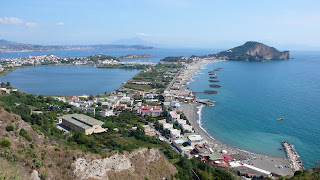The decline of a leader who ruled from a beautiful place of exile
.jpg) |
| The Death of Tiberius, perhaps attended by Caligula, imagined in an 1864 painting by Jean-Paul Laurens |
Tiberius had become the second Roman Emperor, succeeding his stepfather, Augustus, in 14 AD. As a young man, he had been a successful general, but at the age of 36 he chose to retire and go and live in Rhodes because he was determined to avoid getting involved in politics.
However, after the deaths of both grandsons of Augustus, his ailing stepfather had no choice but to make Tiberius his heir.
Tiberius inherited the throne at the age of 54 and was at first a hardworking ruler, trying to pass sensible and far-seeing laws. He stopped pointless, costly conflicts and the waste of the empire’s money and was said to have left the imperial coffers much fuller than when he inherited them.
But he was constantly at odds with the Senate, who claimed he gave vague orders to them and that they had to debate the orders among themselves so that they could decide what to do and therefore some of his legislation was never passed.
_Tib%C3%A8re_-_Mus%C3%A9e_Saint-Raymond_Ra_342_b.jpg) |
| Tiberius left Rome after 13 years and never returned to the city |
As the years passed by, Tiberius became increasingly paranoid and brooded constantly on the loss of his son, Drusus Julius Caesar, who was said to have died in mysterious circumstances.
Many historians have claimed that Tiberius became steadily more cruel and vindictive as he grew older, and that he enjoyed torturing his victims, the people he perceived to be his enemies. He then liked to kill them by having them thrown off the cliffs at a spot on Capri that has become known as Salto di Tiberio - Tiberius’s Leap.
One senator was allegedly condemned to death just for having carried a coin, with the head of Tiberius on it, into a public lavatory with him.
The Emperor Tiberius was also reputed to have become a paedophile, bringing in young boys and girls to take part in imperial orgies at his villa on Capri.
When he was 71, Tiberius brought his 18-year-old great-nephew, Caligula, to live on Capri and subsequently named him as heir to the empire. For six years Caligula remained docile and obedient towards Tiberius, although he was said to occasionally display signs of the sadism that would subsequently blight his years as emperor.
Early in AD 37, Tiberius travelled to what was then Misenum to take part in military games. After injuring his shoulder throwing the javelin, he became seriously ill. He eventually lapsed into unconsciousness and doctors declared that his death would be imminent. Caligula then took the imperial ring from his great uncle’s finger and showed himself to a local crowd as the new Roman emperor.
Then Tiberius apparently woke from his coma and demanded food, which terrified Caligula. However, one of the heir’s quick-thinking allies rushed into the bedroom of Tiberius and finished him off by smothering him in a blanket. Tiberius was 77 when he died and he had been in power for 22 years.
The historian Tacitus wrote that people in Rome cheered when they heard that Tiberius was dead, only to panic when they heard he had recovered. Then they rejoiced again when they heard that the debauched emperor’s life had finally ended.
 |
| Modern Miseno, looking towards Capo Miseno, which offers views across the Bay of Naples |
Misenum, where Tiberius was injured and died, is now known as Miseno and is one of the frazioni of Bacoli in the province of Naples. Nearby Capo Miseno marks the north western end of the Bay of Naples, from where there are incredible views of Capri, Ischia, Sorrento, and Mount Vesuvius. For centuries, Misenum was the biggest naval base in the Roman empire and housed thousands of sailors. Its beautiful natural setting and proximity to the nearby Roman cities of Puteoli - modern Pozzuoli - and Neapolis (Naples), Misenum also became a popular location for Roman luxury villas.
 |
| Villa Jovis, as it might have looked in the time of Tiberius. Today, there are only ruins |
Tiberius ruled his empire from the Villa Jovis on Capri and the sheer cliff beside the villa, known as the Salto di Tiberio - Tiberius’s Leap - is said to be the precipice from which the Emperor had his victims hurled to their deaths. The biggest of 12 residences Tiberius had built on Capri, Villa Jovis occupies a spectacular position at the top of Monte Tiberio on the north east corner of the island. With an elevation of 334m (1,096ft), Monte Tiberio is the second-highest peak on the island, topped only by Monte Solaro (589m; 1,932ft) in Anacapri. Access to the remains of the villa is only possible on foot, and involves an uphill walk of about two kilometres from Capri town along Via Tiberio.
Also on this day:
1820: The birth of tenor Enrico Tamberlik
1886: The birth of athlete Emilio Lunghi - Italy’s first Olympic medallist
1940: The birth of film director Bernardo Bertolucci
1978: The kidnapping of former Italian PM Aldo Moro
.png)



.jpg)

%20(1).jpg)
.jpg)



.jpg)
.jpg)
